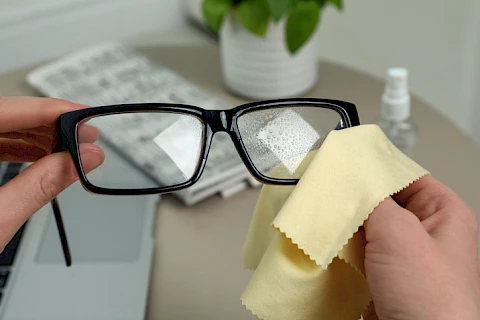
Our vision often changes as we get older, making eyeglasses and contact lenses necessary for maintaining clear sight and overall eye health. Proper care of these items ensures they function as intended and last as long as possible. Learn practical tips on how to clean, store, and replace eyeglasses and contact lenses, as well as what to do if your eyewear becomes damaged or lost.
Regular Cleaning
To keep your eyeglasses in good condition, you must regularly clean them. Use a cleaning solution specifically designed for eyeglasses. Avoid household cleaners as they can damage the lenses. Use eyeglass cleaner or a mild dish soap and a microfiber cloth to avoid scratches. Start by rinsing your eyeglasses with lukewarm water. Apply a small drop of cleaner or soap, then gently rub the lenses and frame. Rinse off the cleaner thoroughly and dry with a clean microfiber cloth.
Cleaning contact lenses daily helps prevent eye infections and ensures clear vision. Always use the solution recommended by your eye care provider. Never use tap water, as it can contain harmful bacteria. Wash and dry your hands before handling lenses. Rub and rinse the lenses with the solution, then place them in a clean storage case filled with fresh solution overnight.
Proper Storage
Proper storage of eyeglasses can prevent damage and scratches. Store your eyeglasses in a hard case when not in use. Soft cases are less effective but better than nothing. Don't place eyeglasses face down, and avoid leaving them in hot spaces, like the car dashboard.
Properly storing contact lenses maintains their condition and prevents eye infections. Always use the lens case provided by your eye care provider and replace it every three months. Clean your lens case with solution, not water, and let it air dry to avoid bacterial growth.
Timely Replacements
Knowing when it's time for new eyeglasses ensures your vision stays clear and precise. Look for signs that your eyeglasses need replacement, such as scratched or damaged lenses or frequent squinting or eye strain. Visit your eye care provider annually or as recommended, and update your prescription as needed.
Contact lenses have a specific lifespan, and using them beyond this can harm your eyes. Adhere to the replacement schedule given by your eye care provider. Daily, bi-weekly, and monthly lenses all have different replacement times. Using old or damaged lenses increases the risk of eye infections and can lead to discomfort and reduced vision quality.
Handling Damaged or Lost Eyewear
If your eyeglasses are damaged, there are steps you can take to manage the situation. For temporary fixes, use an eyeglass repair kit for minor adjustments, or tape can temporarily hold broken parts. For professional repair, visit an optician. If they're beyond repair, consider getting new glasses.
Dealing with damaged or lost contact lenses requires quick action to maintain eye health. Stop using a damaged lens immediately and use a backup pair if you have one. Reach out to your eye care provider for a replacement and follow their instructions for what to do until you get new lenses.
Maintain Good Eye Health for Seniors
Taking good care of your eyeglasses and contact lenses is necessary for keeping your vision clear and your eyes healthy. Regular cleaning, proper storage, and timely replacements can prolong the life of your eyewear. If you experience any issues, don't hesitate to contact your eye care provider. Should you need any assistance with personal support for seniors and other care services, Senior Helpers Southeastern Indiana is here to help. Contact us today for personalized support in Corydon, Charlestown, New Albany, Madison, or North Vernon.